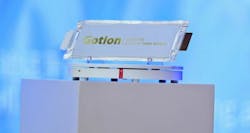Solid-State EV Battery Charges Up to 80% in Just 9.8 Minutes
Batteries are evolving toward greater capacity and higher specific energy to meet consumer demand for longer driving range. The increase in the capacity of a single battery helps to reduce the number of batteries in the system.
At its 13th Technology Conference on May 17 in Hefei, Anhui province China, where it’s headquartered, Gotion High-tech unveiled a 5C fast-charging G-current battery that can charge up to 80% in just 9.8 minutes, a new all-solid-state battery technology, as well as a high-nickel NCM cylindrical Stellary battery. The battery type is usually named after its cathode materials, such as a NCM (nickel, cobalt, and manganese) battery or LFP (lithium iron phosphate) battery.
According to the company, the prismatic rectangular G-current battery enables 90% energy replenishment with 15 minutes of charging. This solution is said to be applicable to the entire range of automotive battery uses, including BEVs or hybrid vehicles, covering lithium manganese iron phosphate (LMFP), LFP, and NCM chemistry systems. At the conference, Cao Yong, Vice President of the Engineering R&D Institute of Gotion High-tech, stated that the company is ready for mass production.
Gen7 Cuts Manufacturing Costs by 50%
The Stellary battery uses Gotion High-tech's self-developed, second-generation silicon-carbon material and fast-charging electrolyte, enabling charging from 10% to 70% state of charge (SOC) in just 9 minutes over 2,500 cycles at room temperature. Battery packs equipped with this cell can complete 350-km range worth of charging in five minutes and 600-km range charging in 10 minutes.
Gotion added that the structural design of the Stellary Battery Pack can dissipate 70% of the heat outside the battery pack within just three seconds, ensuring maximum-speed cooling under extreme conditions. Thermal runaway propagation occurs when one lithium-ion cell in a pack catches on fire and spreads throughout the entire pack. This is important since safety problems, and in particular thermal propagation, are always a priority for the design of battery systems.
The Stellary Battery also integrates wireless battery-management system (BMS) technology, improving the battery’s reliability. The Stellary battery will be produced by Gotion High-tech's Gen7 factory, which, according to the company, has achieved µm-level production, the industry's highest standard, and is said to reduce manufacturing costs by 50%.
All-Solid-State Batteries Feature Energy Density of Up to 350 Wh/kg
The Gemstone battery incorporates all-solid-state technology, with an energy density of 350 Wh/kg—over 40% higher than that of mainstream lithium NCM batteries. This enhancement is expected to increase range and improve energy efficiency in electric vehicles.
Gotion aims to start trial production of its all-solid-state batteries by 2027, with volume production targeted for 2030. The prototype battery cell has 30-Ah capacity. Driving range with the battery is anticipated to be 1,000 km (621 miles) on a single charge.
Green Manufacturing Practices
Gotion High-tech has also taken several steps to achieve carbon neutrality by 2040. Through a gradual increase in the number and proportion of zero-carbon factories, as well as the proportion of green logistics transportation, Gotion aims to reduce its own operational energy footprint.
In addition, Gotion High-tech applied digital technology in its energy-management practices to improve the efficiency of energy use, with new systems installed at its six subsidiaries put into operation.
Simultaneously, the company actively increased the usage of renewable-energy sources. Photovoltaic (PV) power stations generated 49.65 million KWh of electricity for the company, up 26.69% from 2022, according to Gotion. In 2023, it invested in a PV power-generation project on nearly 40 km² of land in Wuhai, Inner Mongolia, to build what it says is the world's first zero-carbon cathode material industry base.
From 2021 to 2023, Gotion High-tech experienced an annual increase in total energy consumption with the rise in production capacity. However, the company reports that its unit energy consumption consistently decreased over the same period. In 2023, energy consumption per unit of product decreased by 10.9% year-on-year.
Gotion also contributes to the realization of carbon neutrality through the recycling of battery materials. Gotion High-tech can deal with 50,000 tons of waste batteries and 10,000 tons of scrap pieces annually. The comprehensive recycling rate of the whole battery components is over 92%, which Gotion says is leading the industry.
In the U.S., Gotion High-tech's Fremont factory located in Silicon Valley has a planned production capacity of 1 GWh. It’s the company’s first battery-pack production line in the U.S. market, with an automation rate said to be as high as 85%. The Fremont factory is scheduled to mainly produce portable and residential energy-storage products with capacities ranging from 3 to 30 kWh.

